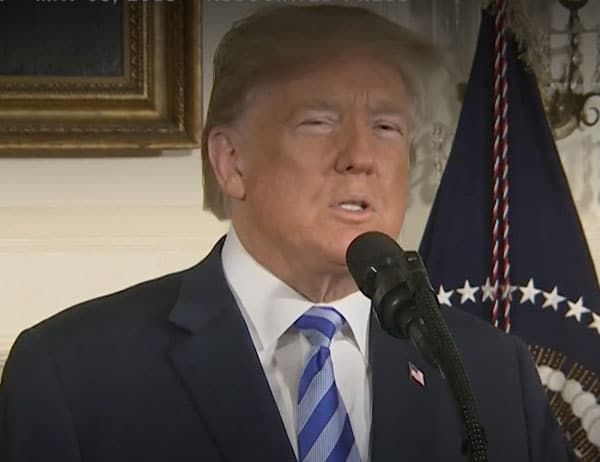A predictable but dangerous Iran announcement
By Elisabeth Eaves | May 8, 2018
 Donald Trump withdraws from the Iran nuclear deal.
Donald Trump withdraws from the Iran nuclear deal.
As if the stakes weren’t high enough to begin with, the US president created a lot of unnecessary drama around his decision to pull out of the Joint Comprehensive Plan of Action, or JCPOA, the landmark 2015 agreement between Tehran and six world powers that scaled back Iranian nuclear activity in exchange for sanctions relief. By drawing out his decision, reality-television style, Trump effectively invited world leaders to lobby him. And so in recent weeks we saw French President Emmanuel Macron and German Chancellor Angela Merkel, whose countries are both party to the JCPOA, urge the United States to stay in the painstakingly crafted agreement, while Israeli Prime Minister Benjamin Netanyahu staged an English-language press conference to make the case that the deal was “based on lies.” Trump indicated he would make an announcement on May 12th, then moved the date up to May 8th, when he finally made his statement that the United States would “exit the Iran deal.”
By that time it hardly came as a surprise, but the decision was still a profound disappointment to many and will likely make the Middle East a less stable, more dangerous place. The New York Times explained on Monday “How the Nuclear Deal Slowed Iran Down.” Prior to the JCPOA, the story notes, Iran’s “breakout time” – the amount of time it would take to produce enough bomb-grade material for one nuclear weapon – was three months or less. After the JCPOA went into effect, breakout time was at least one year.
Now it is likely to shrink again. As Ezra Friedman, a project manager at the Institute for National Security Studies in Tel Aviv, wrote in the Bulletin on Tuesday, “Other Middle Eastern countries would eye such a scenario with extreme worry and would likely begin to develop their own nuclear programs at an accelerated rate in response. The result could be a region with several nuclear-armed or nuclear threshold states: a ‘polynuclear’ Middle East.”
Without any apparent sense of irony, in the same speech as he announced that the US would break its agreement with the world on curbing Iranian nuclear capabilities, Trump said, “When I make promises, I keep them. In fact, Secretary Pompeo is on his way to North Korea in preparation for my meeting with Kim Jong-un.” That would be his meeting with Kim Jong-un to try to convince North Korea to give up its nuclear weapons. It’s hard to say which of Trump’s two fantasies is more unlikely: that Iran will now be convinced to negotiate a “better” nuclear-program-limiting agreement with the United States, or that Kim will agree to get rid of his nuclear arsenal. It is much more likely that Iran will negotiate with Europe, Russia, and China to try to continue the nuclear deal without the United States, as the Washington Post reported, and that if that fails, it will restart unlimited uranium enrichment.
Numerous diplomats, experts, and military leaders, including US and Israeli defense officials, favored the JCPOA as the least-bad way to curtail Iran’s path to a nuclear weapon. But Trump can be sure of supporters in at least one quarter: Iranian hardliners. Within Iran, Trump’s withdrawal will be seen as validating their claim that the United States is never to be trusted, and likely weaken the government of moderate President Hassan Rouhani.
The New York Times’ David Sanger called Tuesday’s announcement “a classic Trumpian move, akin to the days when he would knock down New York buildings to make way for visions of grander, more glorious edifices.” But Trump is taking a risk that could just as likely result in a rubble heap.
Publication Name: The New York Times
To read what we're reading, click here
Together, we make the world safer.
The Bulletin elevates expert voices above the noise. But as an independent nonprofit organization, our operations depend on the support of readers like you. Help us continue to deliver quality journalism that holds leaders accountable. Your support of our work at any level is important. In return, we promise our coverage will be understandable, influential, vigilant, solution-oriented, and fair-minded. Together we can make a difference.
Topics: Nuclear Risk, Nuclear Weapons, What We’re Reading














